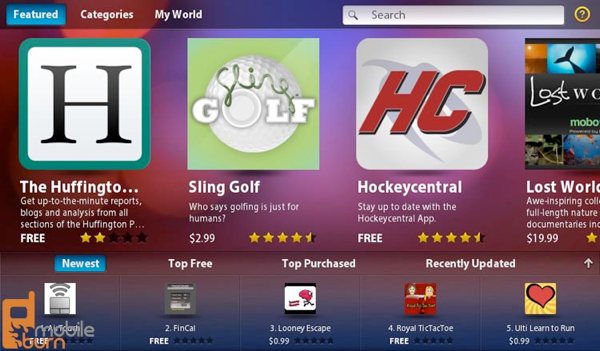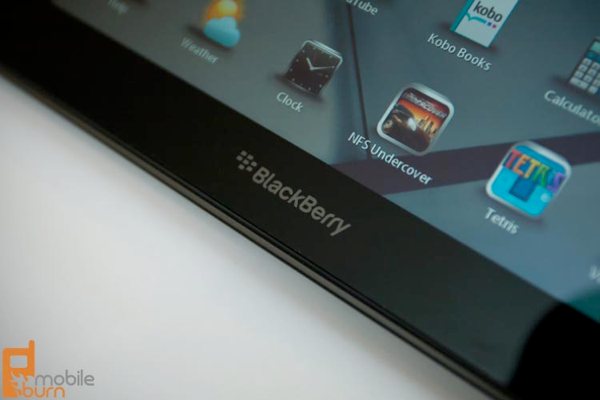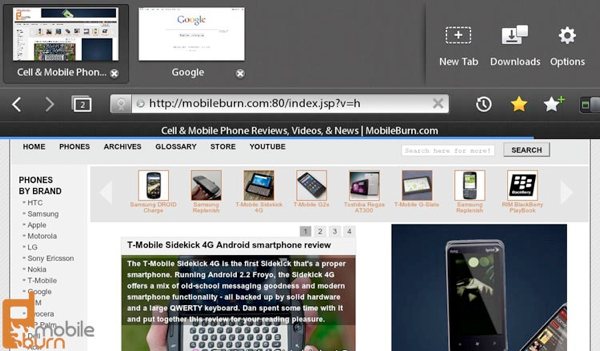Apps and App Store, Browser
Apps and App Store
The real key to the practicality of a tablet or smartphone today are the apps that come with it and the availability of more apps to expand its usefulness. Apple's iPad has over 65,000 apps ready to go in the iTunes App Store, as well as strong email, contact, and calendar apps pre-installed. Google's Android 3.0 Honeycomb platform only has a handful of tablet specific apps currently, but it does provide stellar core apps to manage email, IM, contacts, and calendar and can run existing Android smartphone apps.
Unfortunately, this is where the PlayBook falls flat on its face. RIM has opted not to offer a handful of core applications that any user would expect to see on a modern mobile OS, especially one as flashy as the BlackBerry Tablet OS. The PlayBook has to rely on the browser for standard tasks such as email and social networking. There are shortcuts pre-installed to open Facebook and Twitter in the browser, but there are no native apps for them, and social networking ranks extremely high for many tablet buyers. RIM also left out any form of video conferencing to make use of the front-facing camera, which relegates it to self-portrait use and little else.

RIM did pre-install some apps that do work well, so all is not lost. Word to Go, Sheet to Go, and Slideshow to Go are a range of apps for working with documents, spreadsheets, and PowerPoint presentations, and they work really well. In fact, Word to Go is one of the best mobile word processing experiences we have seen. We would have really like to have the ability to sync our documents with a cloud service such as Google Docs, so hopefully that capability will be added later on. Kobo Books is the e-reader app offered on the PlayBook. It's not as flashy as the apps for the iPad or even Android, but it gets the job done and offers a store from which you can purchase books directly on the tablet.

The BlackBerry App World is said to offer 3,000 apps at launch. However, most of these are extremely basic and menial, covering redundant things such as note-taking over and over. A lot of the apps in the App World appear half baked as well, with bugs and poor user experience seen all over the place. The PlayBook has been promised to support many different app platforms, ranging from Java to Adobe AIR and even Android apps later down the line. But at this moment, the app selection is very weak, and really hampers the potential of the PlayBook.
EA Games developed two headline games for BlackBerry's tablet at launch. Need For Speed Undercover and Tetris are ubiquitous on every smartphone or tablet platform, but they work very well on the PlayBook, utilizing the device's built-in gyroscope and accelerometer.
Browser
The PlayBook's browser elicits a bunch of mixed emotions for us. RIM has touted the browser as offering a desktop experience on a tablet, and has equipped the browser with Adobe Flash Player, HTML5, JavaScript, and support for many other web technologies. Unfortunately, you are bound to encounter bugs along the way which can be frustrating.
The browser can be very fast at a given moment, then be very slow and hang the next, prompting us to repeatedly hit the reload button. Once pages loaded, scrolling was very fast and pinch-to-zoom was smooth and effortless. Video content played well, although at times it, too, could hang.

The browser allows for multiple tabs to be open at the same time, and switching between them is as easy as swiping down from the top of the screen and selecting a different tab. Sometimes, though, the PlayBook would not keep a page loaded in memory and it would need to be reloaded when the tab was selected, something we wouldn't have expected from a device packing 1GB of RAM.
The touch responsiveness in the browser left a bit to be desired as well. Sometimes a tap on a link would not be recognized and we would have to press repeatedly to get the PlayBook to open the page. Sites with heavy use of AJAX and JavaScript, such as Google Reader and Twitter, could be very slow when scrolling, and buttons would be hit or miss as to whether they would respond.